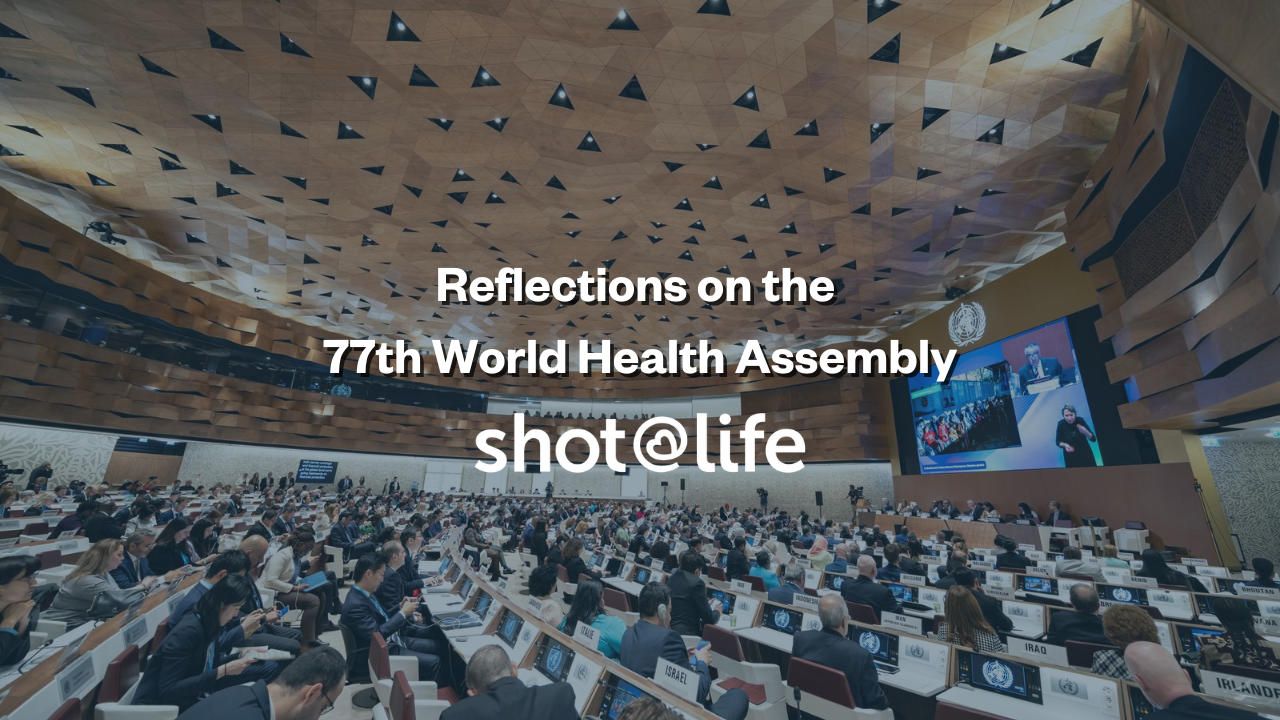Reflections on the 77th World Health Assembly
The world tuned in last week to the 77th World Health Assembly, where leaders in global health convened to discuss a full range of issues under the theme "All for Health, Health for All."

Last week, we were fortunate to join experts, policymakers, and leaders from civil society and the private sector in Geneva for the 77th World Health Assembly (WHA). As at each Assembly, there was a packed agenda covering the full range of public health issues, from pandemic preparedness to anti-microbial resistance, but this year the real action and excitement seemed to be more in the “side events” than in the official sessions within Le Palais.
It was a big week for global immunization, focusing on issues such as the promise of the HPV vaccine to prevent cancers, Gavi’s support of an African Manufacturing Facility to produce vaccines on the continent, recent cholera and measles outbreaks, the polio endgame, as well as the Humanly Possible campaign which celebrates the tremendous progress made against child mortality thanks to the expansion of vaccine access. Here are three of our key takeaways from the week’s discussions.
The need for better integration of health programs
Across several panels and conversations at WHA, the importance of better coordination between agencies and organizations providing different health services was a consistent theme. Too often in low-income countries and hard-to-reach areas, key health interventions are provided by different programs, in different places, at different times. In practice, this raises the cost of time and effort for families to access healthcare services from immunizations to nutritional support to malaria bed nets to basic health screenings.
There was considerable consensus around the need for more co-location of health services and better coordination amongst providers. Improved coordination allows different health programs to leverage each other’s infrastructure and logistics, allowing them to work more efficiently and save limited resources. And most importantly, streamlining the process of visiting a health center and having all of a families’ fundamental needs addressed will improve healthcare access and equity for the most vulnerable.
Zero-dose children are not an immunization problem. Those communities are systematically marginalized.
Alex de Jonquières, Director of Health Systems Strengthening, Gavi, the Vaccine Alliance
The critical role of community health workers
Better support for community health workers, who play an essential role in outreach, health education, and provision of care, has been an increasing focus of the global health community, including at last year’s WHA. This year, a number of high-profile panels featured community health workers as speakers, giving them a platform to directly address the international community and share their stories and their needs.
One point raised by health workers and program leads alike was that on the ground, it is the community health workers that generate legitimacy for international institutions like the World Health Organization (WHO), UNICEF, UNHCR, and global health NGOs, not the other way around. Supporting community health workers with the training, knowledge, equipment, and pay that they need to do their job to the maximum doesn’t just help them provide healthcare to their communities. It helps build the trust the NGOs and UN agencies need to do their jobs effectively.
The issue of salaries for community health workers was also a throughline during the week. Community health workers deserve to be fairly compensated for their critical, lifesaving work as a matter of basic justice. And as numerous analysts pointed out, investments in health workers are simply a matter of good policy. An analysis by the Kenyan government found that every $1 invested in the community health workforce generated 9$ in savings by supporting disease prevention. And countries where the community health workforce is professionalized saw less immunization backsliding during the pandemic.
50 years of global immunization
Finally, this year’s World Health Assembly coincided with the 50th anniversary of the Expanded Program on Immunization, the WHO-led effort to ensure equitable vaccine access for every child. While the challenges to immunization and broader health equity are numerous, and difficulties in agreeing a pandemic treaty dominated the headlines, we should also pause to recognize the historic achievements of global immunization. By now, the numbers may be familiar, but they are no less impressive: more than 154 million lives saved by immunizations since 1974, equaling six lives saved every single minute of the last five decades.
As we acknowledge the challenges to global health coordination, support for essential health workers, and reaching every last child with vaccines, let us also remember that immunization has been one of our greatest achievements. Let us recommit to protecting that achievement and building on it, so every child in the generations to come has a shot at life.
Martha Rebour, Executive Director & Brent Nagel, Communications Officer
